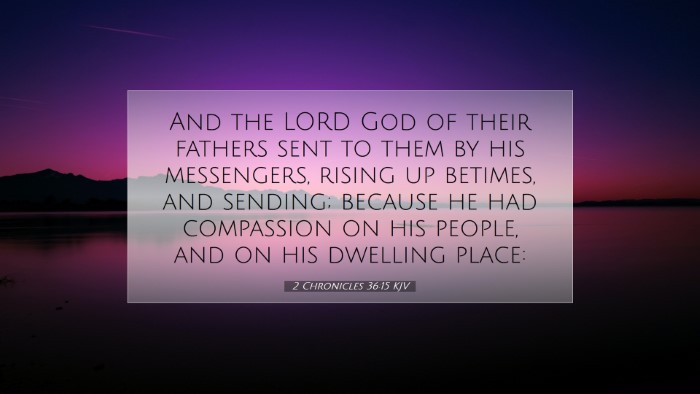Commentary on 2 Chronicles 36:15
Verse: "And the LORD God of their fathers sent to them by his messengers, rising up betimes, and sending; because he had compassion on his people, and on his dwelling place."
Introduction
This verse marks a critical point in the history of Israel, illustrating God's persistent compassion and desire for reconciliation with His people. It highlights the challenges faced by Israel in the context of their disobedience and the severe consequences that followed. The sentiment expressed in this passage can evoke reflections on God’s nature, His patience, and the collective attitudes of His people.
Main Themes
- Divine Compassion: God's willingness to send messengers indicates His heartfelt desire for His people to return to Him.
- Human Rebellion: This passage reflects the pattern of rebellion among the Israelites, showcasing the struggle between divine mercy and human disobedience.
- Prophetic Ministry: The mention of messengers alludes to the important role of prophets in communicating God’s message and calling people to repentance.
Commentary Insights
Divine Compassion
Matthew Henry emphasizes that God's compassion is evident in His continual efforts to reach out to His wayward people. He observes that God sent messengers 'rising up betimes,' which suggests that the Lord was not only willing, but eager to aid His people in their plight. This demonstrates God's character as one who seeks to guide His children back to the right path, rather than simply meting out judgment.
Albert Barnes elaborates further on the significance of God's patience, noting that He sends His prophets repeatedly, highlighting the repetitive nature of God’s patience in light of human stubbornness. This theme of compassion serves as a reminder of the steadfast love that persists despite continual disobedience.
Human Rebellion
The context surrounding this verse illustrates Israel's ongoing rebellion, a theme prominently featured in the writings of Adam Clarke. He points out that despite the divine overtures towards repentance, the chronic defiance of Israel ultimately leads to severe consequences. Israel's history, littered with rejection of divine guidance, paves the way for their impending captivity.
Clarke’s commentary reinforces the idea that the tragedy of human sin does not negate God's grace, but rather positions it as a profound backdrop against which divine mercy shines. The steadfastness of Israel's rebellion stands in stark contrast to the constant willingness of God to forgive and restore.
Prophetic Ministry
The role of messengers or prophets is pivotal in this verse. Matthew Henry discusses how these individuals serve as intermediaries between God and His people, often at great personal cost. Their urgent messages were expressions of God’s heartfelt desire to see His people repent and return to Him. The phrase "rising up betimes" reflects the urgency of these calls, suggesting that God’s invitations to turn back are made with intensity and passion.
Albert Barnes highlights that the majority of these prophetic messages were often met with resistance and derision, a reality that underscores the difficult task of speaking truth to a rebellious audience. This theme of prophetic ministry shows not only the responsibility of the messengers but also the heartbreak that accompanies their calling.
Theological Reflections
This passage encapsulates a theology of divine mercy that coexists with human volition. It raises important questions for pastors and theologians regarding the nature of God’s calls for repentance and the human response to those calls. How does one reconcile the justice of God with His enduring mercy? Are we, too, like Israel in our stubbornness?
Practical Applications
- Call to Repentance: This verse serves as a timeless reminder for the church to remain vigilant in examining its own ways and responding to God’s messengers today.
- Embrace of Divine Mercy: Believers are encouraged to embrace the reality of God’s compassion and to share that message of hope with others who might be struggling.
- Role of the Church in Prophetic Ministry: The church is called to be a prophetic voice in society, courageously standing for truth and urging a return to God amidst a culture that often rejects His ways.
Conclusion
2 Chronicles 36:15 highlights not only the compassion of God but also the gravity of human choice. It serves as a poignant reminder of the continuous outreach of God to His people and the profound repercussions of turning away from His call. For pastors, students, theologians, and Bible scholars, this passage invites deep reflection on the ways in which they, too, may be called to act as messengers of God's compassion in a world averse to His truth.


